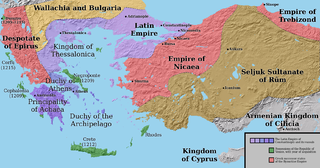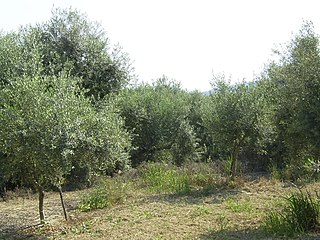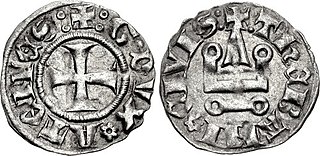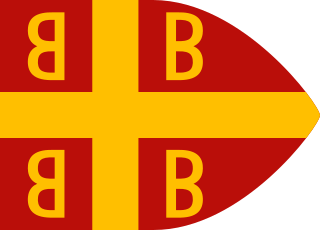Related Research Articles

Year 1320 (MCCCXX) was a leap year starting on Tuesday of the Julian calendar.

Year 1205 (MCCV) was a common year starting on Saturday of the Julian calendar.

Year 1263 (MCCLXIII) was a common year starting on Monday of the Julian calendar.

Year 1281 (MCCLXXXI) was a common year starting on Wednesday of the Julian calendar.

The Fourth Crusade (1202–1204) was a Latin Christian armed expedition called by Pope Innocent III. The stated intent of the expedition was to recapture the Muslim-controlled city of Jerusalem, by first defeating the powerful Egyptian Ayyubid Sultanate. However, a sequence of economic and political events culminated in the Crusader army's 1202 siege of Zara and the 1204 sack of Constantinople, rather than the conquest of Egypt as originally planned. This led to the Partitio terrarum imperii Romaniae or the partition of the Byzantine Empire by the Crusaders and their Venetian allies leading to a period known as Frankokratia, or "Rule of the Franks" in Greek.

The Principality of Achaea or Principality of Morea was one of the vassal states of the Latin Empire, which replaced the Byzantine Empire after the capture of Constantinople during the Fourth Crusade. It became a vassal of the Kingdom of Thessalonica, along with the Duchy of Athens, until Thessalonica was captured by Theodore, the despot of Epirus, in 1224. After this, Achaea became for a while the dominant power in Greece.

The Duchy of Athens was one of the Crusader states set up in Greece after the conquest of the Byzantine Empire during the Fourth Crusade as part of the process known as Frankokratia, encompassing the regions of Attica and Boeotia, and surviving until its conquest by the Ottoman Empire in the 15th century.
The Battle of Pelagonia or Battle of Kastoria took place in early summer or autumn 1259, between the Empire of Nicaea and an anti-Nicaean alliance comprising Despotate of Epirus, Kingdom of Sicily and the Principality of Achaea. It was a decisive event in the history of the Eastern Mediterranean, ensuring the eventual reconquest of Constantinople and the end of the Latin Empire in 1261.
During the late Middle Ages, the two cities of Argos and Nauplia formed a lordship within the Frankish-ruled Morea in southern Greece.

The Battle of the Olive Grove of Kountouras took place in the summer of 1205, in Messenia in the Morea peninsula, between the Frankish Crusaders and the local Byzantine Greeks, resulting in a victory of the Franks and the collapse of the local resistance.
Guy I de la Roche (1205–1263) was the Duke of Athens, the son and successor of the first duke Othon. After the conquest of Thebes, Othon gave half the city in lordship to Guy.

Guy II de la Roche, also known as Guyot or Guidotto, was the Duke of Athens from 1287, the last duke of his family. He succeeded as a minor on the death of his father, William I, at a time when the duchy of Athens had exceeded the Principality of Achaea in wealth, power, and importance.
William I de la Roche succeeded his brother, John I, as Duke of Athens in 1280. He was the son of Guy I de la Roche.
Nicholas I Sanudo was the fifth Duke of the Archipelago from 1323 to his death. He was the son and successor of William I of the House of Sanudo.

Boniface of Verona was a Lombard Crusader lord in Frankish Greece during the late 13th and early 14th century. A third son from a junior branch of his family, he sold his castle to equip himself as a knight, became a protégé of Guy II de la Roche, Duke of Athens, expelled the Byzantines from Euboea in 1296, and advanced to become one of the most powerful lords of Frankish Greece. Following Guy II's death, he served as regent for the Duchy of Athens in 1308–09, and was captured by the Catalan Company in the Battle of Halmyros in March 1311. The Catalans held Boniface in high regard, and offered to make him their leader. Boniface refused, but retained close relations with them, sharing their hostility towards the Republic of Venice and its own interests in Euboea. Boniface died in late 1317 or early 1318, leaving his son-in-law, the Catalan vicar-general Alfonso Fadrique, as the heir of his domains.

The Palaiologan army refers to the military forces of the Byzantine Empire under the rule of the Palaiologos dynasty, from the late 13th century to its final collapse in the mid-15th century. The army was a direct continuation of the forces of the Empire of Nicaea, which itself was a fractured component of the formidable Komnenian army of the 12th century. Under the first Palaiologan emperor, Michael VIII, the army's role took an increasingly offensive role whilst the naval forces of the empire, weakened since the days of Andronikos I Komnenos, were boosted to include thousands of skilled sailors and some 80 ships. Due to the lack of land to support the army, the empire required the use of large numbers of mercenaries.

The Battle of Neopatras was fought in the early 1270s between a Byzantine army besieging the city of Neopatras and the forces of John I Doukas, ruler of Thessaly. The battle was a rout for the Byzantine army, which was caught by surprise and defeated by a much smaller but more disciplined force.

The Battle of Demetrias was a sea engagement fought at Volos in Greece in the early 1270s between a Byzantine fleet and the assembled forces of the Latin barons of Euboea (Negroponte) and Crete. The battle was fierce, and initially in favour of the Latins, but the timely arrival of Byzantine reinforcements tipped the scale, resulting in a crushing Byzantine victory.

The Barony of Chalandritsa was a medieval Frankish fiefdom of the Principality of Achaea, located in the northern Peloponnese peninsula in Greece, and centred on the town of Chalandritsa south of Patras.
Geoffrey of Briel, in older literature Geoffrey of Bruyères, was a French knight and the third lord of the Barony of Karytaina in the Principality of Achaea, in Frankish Greece. He led a colourful and turbulent life, narrated in detail in the Chronicle of the Morea. Accounted the finest knight in the Principality, he fought in the wars against the Byzantine Greeks, was captured in the Battle of Pelagonia in 1259, and was sent back to Achaea bearing the Byzantine terms in 1261. Geoffrey was twice deprived of his barony, once for rebelling against his uncle, the Prince of Achaea William II of Villehardouin, and then for abandoning the Principality without leave in order to spend time with a mistress, the wife of one of his feudatories, in Italy. He was pardoned both times, but henceforth held his title as a gift of the Prince. He died childless in 1275, and the Barony of Karytaina was split up.
References
- Gregorovius, Ferdinand. Geschichte der Stadt Athen im Mittelater. Stuttgart: 1889.
- Longnon, Jean (1969) [1962]. "The Frankish States in Greece, 1204–1311". In Setton, Kenneth M.; Wolff, Robert Lee; Hazard, Harry W. (eds.). A History of the Crusades, Volume II: The Later Crusades, 1189–1311 (Second ed.). Madison, Milwaukee, and London: University of Wisconsin Press. pp. 234–275. ISBN 0-299-04844-6.